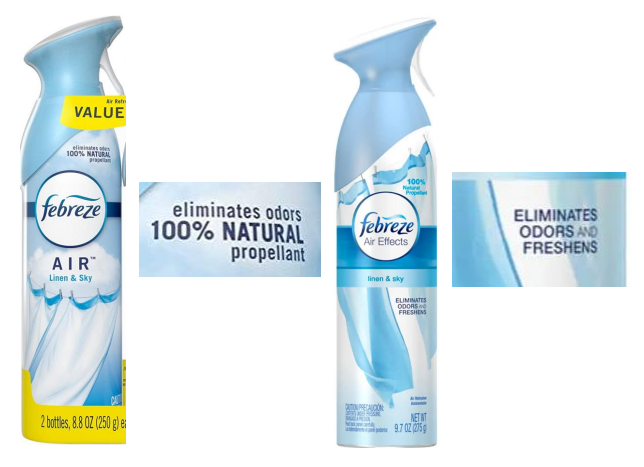Febreze Air Fresheners Falsely Advertised as Able to Eliminate Odors, Class Action Claims
by Erin Shaak
Last Updated on September 2, 2022
Pijacki v. The Procter & Gamble Company
Filed: August 19, 2022 ◆§ 1:22-cv-00624
Febreze aerosol air fresheners are falsely advertised in that their main active ingredient is unable to “eliminate[] odors,” a lawsuit alleges.
New York
Febreze aerosol air fresheners are falsely advertised as able to “eliminate[] odors,” a proposed class action alleges.

The 13-page complaint says that although the Febreze aerosols at issue are advertised as “designed to actually eliminate bad odors without just masking them,” the products’ active ingredient is unable to actually destroy, convert or transform odors.
Although the Febreze products in fact contain certain odor absorbers, “no credible scientific evidence” shows that the compounds in the sprays can transform or destroy bad odors to the point where they are eliminated entirely, or at least made undetectable, the filing relays.
The lawsuit claims Febreze-maker The Procter & Gamble Company has sold more of the air fresheners, and at a higher price, than it would have absent the allegedly misleading representation that the products are able to eliminate odors.
According to the suit, consumers understand the defendant’s representations to mean that the Febreze products can eliminate odors either at the molecular level through the physical destruction of odor molecules or at the olfactory level through the reduction of odor molecules to the point where odor is not detected.
The case asserts, however, that the Febreze products cannot achieve odor elimination through either criterion.
Per the suit, the Febreze air fresheners’ main ingredient, hydroxypropyl beta-cyclodextrin, does not physically destroy or otherwise eliminate odor molecules “but merely envelops and sequesters them” so they are prevented from being released into the air. Moreover, cyclodextrins, according to the case, are subject to certain real-world limitations that cause them to be ineffective at reducing the perception of odors.
The lawsuit charges that the defendant’s studies that seemingly support the Febreze products’ odor-destroying claims are “flawed” and failed to test whether consumers could detect malodor after application of the air fresheners. Moreover, the studies showed that even the trained sensory experts who evaluated the product determined that malodor was not eliminated in 80 percent of the test chambers, the lawsuit says.
Per the case, these findings were confirmed by studies that evaluated the Febreze products under ASTM standards. The suit says these studies involved testing how well the Febreze air freshener could eliminate the scent of bacon after it was cooked in a microwave. According to the complaint, the evaluations found that the product was unable to reduce the bacon aroma to “undetectable levels.”
The lawsuit alleges that the Febreze product is worth “materially less” than its value as represented by Procter & Gamble and that because of the company’s misrepresentations, consumers have paid more for and purchased more of the air fresheners than they otherwise would have.
The case looks to represent anyone in New York, New Mexico, Utah, Montana, Idaho and Alaska who purchased Febreze air fresheners within the applicable statute of limitations period.
What if I don’t live in one of those states?
At this time, the lawsuit is only looking to cover people in New York, New Mexico, Utah, Montana, Idaho and Alaska. Different states have different laws, and that’s why some class actions look to cover only residents of certain states.
That doesn’t mean you’re out of luck if you don’t live in one of the states mentioned, though. Depending on your state’s laws, another lawsuit could be filed to cover people in your state. If you’re interested in taking legal action, you may want to reach out to an attorney in your area to find out more about your legal rights and options. Attorneys typically offer free initial consultations.
Get class action lawsuit news sent to your inbox – sign up for ClassAction.org’s newsletter here.
Video Game Addiction Lawsuits
If your child suffers from video game addiction — including Fortnite addiction or Roblox addiction — you may be able to take legal action. Gamers 18 to 22 may also qualify.
Learn more:Video Game Addiction Lawsuit
Depo-Provera Lawsuits
Anyone who received Depo-Provera or Depo-Provera SubQ injections and has been diagnosed with meningioma, a type of brain tumor, may be able to take legal action.
Read more: Depo-Provera Lawsuit
How Do I Join a Class Action Lawsuit?
Did you know there's usually nothing you need to do to join, sign up for, or add your name to new class action lawsuits when they're initially filed?
Read more here: How Do I Join a Class Action Lawsuit?
Stay Current
Sign Up For
Our Newsletter
New cases and investigations, settlement deadlines, and news straight to your inbox.
Before commenting, please review our comment policy.